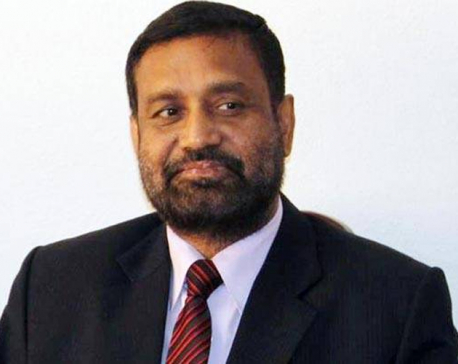
OR
Pull-out of CPN (Maoist Center)
After Prime Minister KP Sharma Oli publicly disowned the May 5th ‘gentleman’s agreement’ to hand over government leadership to Pushpa Kamal Dahal, it seemed like a matter of time before Dahal’s CPN (Maoist Center) pulled the plug on Oli government. The coalition cookie duly crumbled on Tuesday when the Maoists announced that they were quitting the government. Maoist chairman Dahal clearly wants to be the prime minister for the second time. It was for this reason that he had been seeking the support of Nepali Congress, the largest party in parliament, for a new national unity government under his leadership—a government including UML as well as the protesting Madheshi parties. It was a sensible idea. Even if UML was somehow booted out of government, it wouldn’t have been possible to amend the new constitution, to the liking of the protesting parties, without UML’s support. But with Congress reluctant to join a coalition that included UML, its arch electoral rival, and with no progress on resolving outstanding constitutional issues, the Maoist party was forced to rethink, even if it meant replacing one majority government with another majority government. Moreover, senior Congress leaders had also repeatedly told the Maoists that government change was possible only if it first pulled out of Oli coalition.
The Maoists were also not satisfied with progress on transitional justice. Senior Maoist leaders increasingly feared—particularly after India started raising the issue of justice for conflict victims in various global forums—that they could be implicated for war crimes. True, the 9-point agreement between UML and Maoists more or less provided for blanket amnesty for conflict-era rights abusers. But given its ambitious scope, the agreement could not be implemented. It is primarily for these two reasons that the Maoists decided to finally ditch Oli. So what happens now? There was a lot of confusion about whether the prime minister would voluntarily step down or face a no-confidence motion in parliament. Talking to Republica, the prime minister’s press advisor, Pramod Dahal, said that the no-confidence option was the more likely option. But we would like to see the prime minister step down voluntarily. We fear a no-confidence motion will further increase the polarization in an already badly polarized polity. It would also reflect poorly on Oli, trying to cling on in the face of the inevitable.
Another majority government is now a near certainty. But even if there is to be yet another coalition government, we would like to see some kind of a prior political agreement among at least the four major political forces—Congress, UML, Maoists and Madheshi parties. This agreement will spell out their common vision on the amendment of the new constitution so as to accommodate the concerns of the Madheshi and Janajati forces now assembled under the Federal Alliance. That, in fact, is the only way out of the current political and constitutional logjam. Moreover, there is no need for UML or Congress or any other party to fear that those controlling the instruments of power will influence elections to their favor. Save for sporadic incidents the last two CA elections were largely free and fair, closely overseen by capable national and international observers. If those in government could so easily rig the elections, contemporary Nepal would also not have such a strong tradition of voting out the incumbent parties. Instead of fanning this fire of fear, going into the next electoral cycle, all the parties should be looking to strengthen their organizations and coming up with convincing electoral agendas. But that is not the first order of business, which is to try to accommodate the demands of the Federal Alliance.
We hope that in the new political climate the alliance will also review its protest programs and now be ready to unconditionally sit for talks with the Big Three. The ouster of KP Sharma Oli offers a ray of hope, however dim, that the protracted constitutional dispute will finally be settled. This great opportunity for a more consensual constitutional settlement should not be wasted. For without such broad ownership of the constitution, we fear, it will be impossible for Nepal to witness a semblance of political stability, which in turn is indispensible for lasting peace and prosperity.
You May Like This

Employment opportunity for youths on priority
KATHMANDU, March 17: Newly-appointed Minister for Labour and Employment and Social Security Gokarna Bista said that he would put his... Read More...

Election historical opportunity for all parties: Home Minister
POKHARA, April 19: Deputy Prime Minister and Home Minister Bimalendra Nidhi has said that the upcoming local level elections were... Read More...

Opportunity for China
China could become a major source of innovation, equaling or even exceeding America ... Read More...







Just In
- Rain shocks: On the monsoon in 2024
- Govt receives 1,658 proposals for startup loans; Minimum of 50 points required for eligibility
- Unified Socialist leader Sodari appointed Sudurpaschim CM
- One Nepali dies in UAE flood
- Madhesh Province CM Yadav expands cabinet
- 12-hour OPD service at Damauli Hospital from Thursday
- Lawmaker Dr Sharma provides Rs 2 million to children's hospital
- BFIs' lending to private sector increases by only 4.3 percent to Rs 5.087 trillion in first eight months of current FY












Leave A Comment